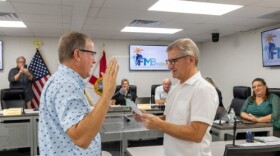JENNIFER LUDDEN, host:
From NPR News, this is ALL THINGS CONSIDERED. I'm Jennifer Ludden.
In the American West, some things change and some things always stay the same. This is a story that has a little of both. For over a century Basque immigrants from the Pyrenees of Spain and France herded sheep high in the mountains throughout the West. Sheepherders are still there, though they mostly come from other countries. And while there are now cell phones and some other modern conveniences, there are still the long, lonely hours to deal with. Anne Marie Ruff reports from Kern County, California.
(Soundbite of sheep)
ANNE MARIE RUFF reporting:
Not far from a rocket launch pad in the Tehachapi Mountains, thousands of sheep graze on the dusty green brush of the Mojave Desert, just as they have every summer since the 1880s. If you follow the dirt tracks off the highway, you might find a sheepherder's camp, and you might even find a herder living all alone with his flock. But if you drive a hundred miles through the Tehachapi Pass into Bakersfield, you can find a place where the herders, past and present, flock for food and company.
(Soundbite of ambient noise in restaurant)
RUFF: This is the Noriega Hotel, a Basque boardinghouse and restaurant catering to sheepherders since 1893. Pierre Arriett(ph), a French Basque, just celebrated his 80th birthday at the Noriega.
And when did you come to America?
Mr. PIERRE ARRIETT (Former Sheepherder): America, OK, 1950.
RUFF: And what did you do when you first got here?
Mr. ARRIETT: Sheepherder.
RUFF: And how many years did you do that for?
Mr. ARRIETT: For 20 years.
RUFF: Aside from the Noriega, there are a dozen other Basque restaurants in Bakersfield. Until the 1980s, when the economy in the Pyrenees improved, almost every herder in California's Central Valley came directly from the Basque country. Pierre says he started out living in a tent and then a trailer, eating lots of lamb meat and cooking his own bread, alone for months at a time. He quit herding because he got so lonely.
These days most of the sheepherders are from Peru and Chile. Many of the herd owners are now Basque. Paco Iturrirria was once a Basque herder. He came from Spain in 1952 and worked for two years before he was given his first wages. Now he himself is a herd owner. He looks like a cowboy with a weathered face, wearing boots and jeans and talking about how herding has changed.
Mr. PACO ITURRIRRIA (Herd Owner): Completely different because at that time we don't even have refrigerators. We have to make the fire, and now they have butane stoves to cook and everything now.
RUFF: Part of the reason for the change is a 2001 state labor law that, for the first time, provided herders with a minimum wage of $1,200 a month. The law also calls for herd owners to outfit herders' camps with telephones or radios and bathing facilities. Chris Schneider, the executive director of Central California Legal Services, was a driving force behind the new work standards.
Mr. CHRIS SCHNEIDER (Executive Director, Central California Legal Services): This industry for years has lived outside the law.
RUFF: He says that 90 percent of the 500 or so herders in California still work in conditions that aren't completely up to code.
(Soundbite of sheep)
RUFF: Back up in the Mojave Desert, a Peruvian herder lists the amenities of his sheepherding life, along with a fully equipped camper trailer.
Unidentified Man: (Foreign language spoken)
RUFF: He says he has a television and mobile phone and access to a truck to drive to the local town. But conditions are not perfect. He has a 55-gallon drum of water and a shovel for his bathroom needs. And he won't give his name because he's afraid his boss might punish him for speaking out.
Paco Iturrirria claims his herders' camps are up to code. And whatever the working conditions here, many are eager for the job.
Mr. ITURRIRRIA: You've got dozens and dozens. They want to come this way because everybody tells you, `I want to bring my brother. I want to bring my uncle. I want to bring my nephew. I want to bring my son.'
RUFF: They want to come, but right now there are actually few jobs. This century-old way of life may be disappearing as the sheep industry shrinks in California, with increasing restrictions on public grazing land. For NPR News, I'm Anne Marie Ruff. Transcript provided by NPR, Copyright NPR.







